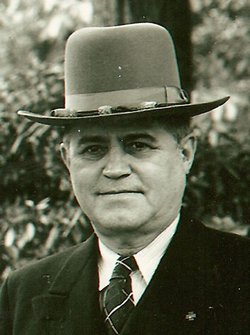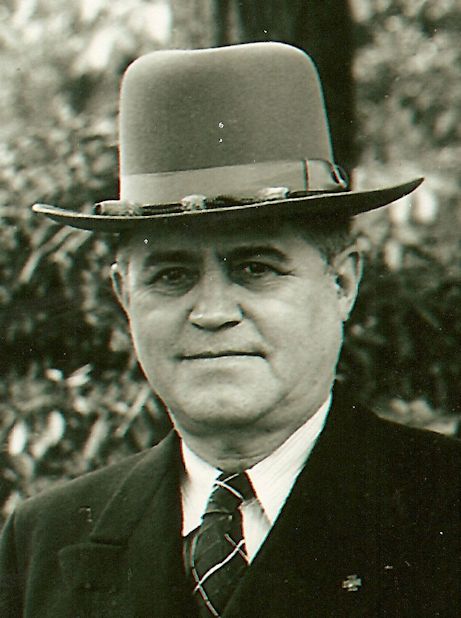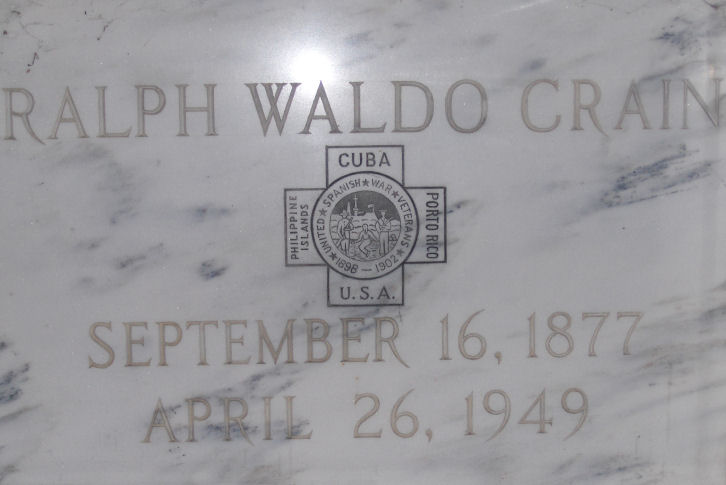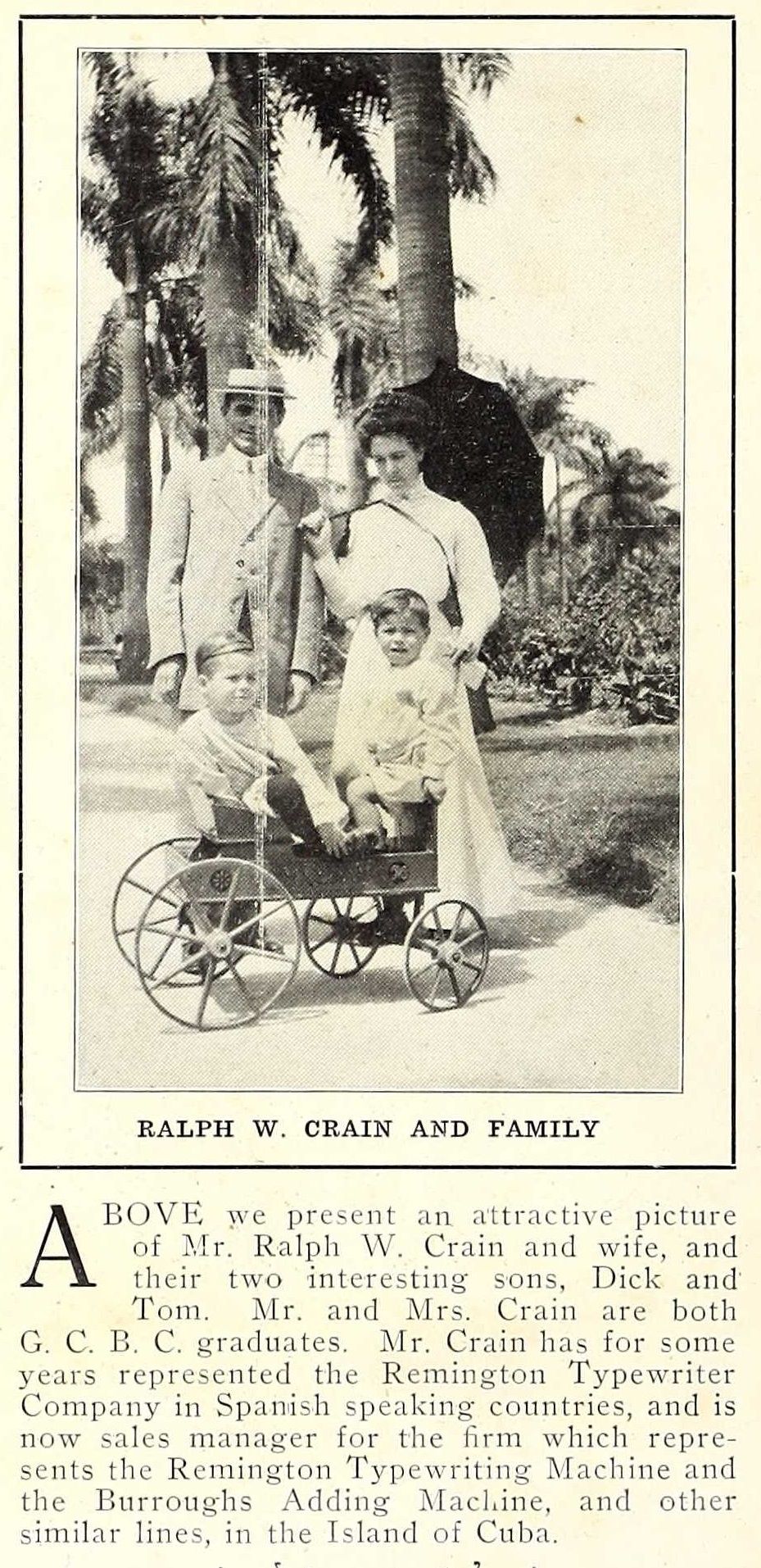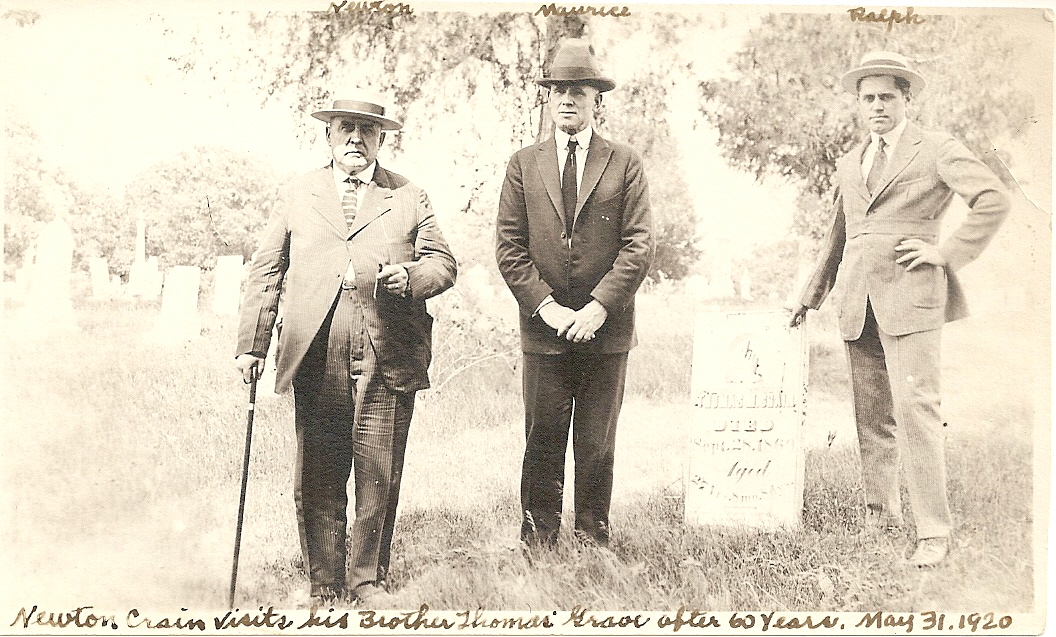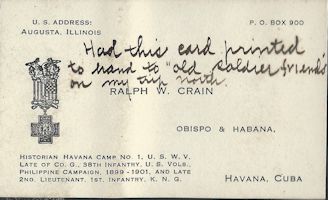Interment in Woodland Mausoleum at Quincy for Prominent Augusta Native
Ralph Waldo Crain was born on September 16, 1877, on the Crain farm two miles west of Huntsville, Schuyler County Illinois. This was the same farm on which his grandfather, Rev. Wm. Crain, settled in 1835 and which remained in the possession of the Crain family for 110 years.
Ralph attended the Baxter school which was a short distance east of his home and later attended the Augusta high school, graduating with the class of 1896. He then went to the Kennedy Normal School in Rushville for one term in preparation for teaching. He taught at the Pine Grove school and the next year at the Round Top school, both one room country schools which have recently been discontinued.
In the fall of 1899 Ralph enlisted in Company G, 38th United States Volunteer Infantry at Webb City, Mo. From the Presidio in San Francisco he was sent to Manila. For some time his Company was stationed in Lipa on the island of Luzon where they were engaged in a series of campaigns until the Philippine Insurrection was quelled. While in Lipa he was asked to teach English in a boys' school and in this was he became proficient in the Spanish language. Later he served for more than a year as Deputy Collector of Internal Revenue with headquarters in Iloile on the island of Panay, a job as dangerous as his Army duties had been for he rode horseback thru the jungles carrying actual cash on his person.
Determined to see the world before returning home, Ralph took passage on a tramp steamer loaded with hemp. Leaving Manila, the British freighter, Melbourne, carrying three other passengers came to New York by the way of Ceylon and the Suez Canal, arriving in New York in October 1902.
After attending Gem City Business College in Quincy, Ralph accepted a position with the Remington Typewriter Co. in Salina, Kansas.
On June 7, 1905 Ralph was married to Sadie Thelma Caddick of Quincy, Illinois. They made their first home in Topeka, Kansas. In 1906 Ralph was transferred to Mexico City where Remington was opening their first agency in a Spanish speaking country. Two years later they sent him to Havana, Cuba, where he remained as representative of the company for 23 years.
Since 1923 [someone crossed out 1923 and jotted 1932] he has made his home in Arlington, Virginia. Taking advantage of the educational facilities of Washington, D. C., Ralph attended Law School graduating in his 60th year standing in 8th place in a class of 270 students.
In 1936 he went into the real estate business and became a prominent Realtor of Arlington, Virginia.
While living outside the U. S. his home was always open not only to his relatives and friends but also to many of his countrymen. Many nationally known Americans have shared his hospitality and he was equally ready to extend assistance to any in need. He was keenly interested in the United Spanish War Veterans, serving one term as Commander of the Post at Havana, Cuba. He was a frequent contributor to the National Tribune a paper devoted to the interests of veterans and was also author of the Pulaski section of the "Augusta Story," a historical book published by the local Daughters of the American Revolution. He was a member of the Pulaski Church, a history of which is included in the Pulaski Story.
A few years ago Ralph organized the survivors of the 38th Volunteer Infantry and has since taken an active part in their annual reunions.
Not withstanding his busy life and heavy responsibilities, he found time throughout the years to write almost daily letters to his mother, and took great pleasure in his annual visits home.
Ralph died unexpectedly at his home, 4399 Lee Highway, Arlington, Va., on April 26, 1949. The funeral was held in Arlington at 11A.M., on April 29; there having been a brief service the evening before conducted by the Spanish War Veterans. Interment was made in Woodland Mausoleum at Quincy, Illinois, after services there at 2 P.M., May 2, conducted by Rev. A. K. Byrns, a life long friend of the Crain family.
Ralph W. Crain is survived by his widow and two sons, Ralph W. Crain, Jr., of Arlington, Va., and Earl T. Crain of Santiago, Chili [sic]; three grandchildren, Richard and Elizabeth Crain of Arlington, Va., and Virginia Crain of Santiago, Chili [sic]; one sister, Mary Crain of Augusta; three brothers Harry Crain, and Frank Crain of Augusta and Wm. M. Crain of Arlington, Va. He was preceded in death by his parents, Wm. H. Crain, in 1904, and Rachel Baxter Crain in 1932 and by his brother, Fred Crain, in 1920. Two sisters and two brothers died in infancy.
Thus closes the story of a colorful life marked by intense loyalty and devotion to his country, his family and his friends.
"Funeral Rites for Ralph Crain Held at Quincy," undated clipping, ca. 1949.
Interment in Woodland Mausoleum at Quincy for Prominent Augusta Native
Ralph Waldo Crain was born on September 16, 1877, on the Crain farm two miles west of Huntsville, Schuyler County Illinois. This was the same farm on which his grandfather, Rev. Wm. Crain, settled in 1835 and which remained in the possession of the Crain family for 110 years.
Ralph attended the Baxter school which was a short distance east of his home and later attended the Augusta high school, graduating with the class of 1896. He then went to the Kennedy Normal School in Rushville for one term in preparation for teaching. He taught at the Pine Grove school and the next year at the Round Top school, both one room country schools which have recently been discontinued.
In the fall of 1899 Ralph enlisted in Company G, 38th United States Volunteer Infantry at Webb City, Mo. From the Presidio in San Francisco he was sent to Manila. For some time his Company was stationed in Lipa on the island of Luzon where they were engaged in a series of campaigns until the Philippine Insurrection was quelled. While in Lipa he was asked to teach English in a boys' school and in this was he became proficient in the Spanish language. Later he served for more than a year as Deputy Collector of Internal Revenue with headquarters in Iloile on the island of Panay, a job as dangerous as his Army duties had been for he rode horseback thru the jungles carrying actual cash on his person.
Determined to see the world before returning home, Ralph took passage on a tramp steamer loaded with hemp. Leaving Manila, the British freighter, Melbourne, carrying three other passengers came to New York by the way of Ceylon and the Suez Canal, arriving in New York in October 1902.
After attending Gem City Business College in Quincy, Ralph accepted a position with the Remington Typewriter Co. in Salina, Kansas.
On June 7, 1905 Ralph was married to Sadie Thelma Caddick of Quincy, Illinois. They made their first home in Topeka, Kansas. In 1906 Ralph was transferred to Mexico City where Remington was opening their first agency in a Spanish speaking country. Two years later they sent him to Havana, Cuba, where he remained as representative of the company for 23 years.
Since 1923 [someone crossed out 1923 and jotted 1932] he has made his home in Arlington, Virginia. Taking advantage of the educational facilities of Washington, D. C., Ralph attended Law School graduating in his 60th year standing in 8th place in a class of 270 students.
In 1936 he went into the real estate business and became a prominent Realtor of Arlington, Virginia.
While living outside the U. S. his home was always open not only to his relatives and friends but also to many of his countrymen. Many nationally known Americans have shared his hospitality and he was equally ready to extend assistance to any in need. He was keenly interested in the United Spanish War Veterans, serving one term as Commander of the Post at Havana, Cuba. He was a frequent contributor to the National Tribune a paper devoted to the interests of veterans and was also author of the Pulaski section of the "Augusta Story," a historical book published by the local Daughters of the American Revolution. He was a member of the Pulaski Church, a history of which is included in the Pulaski Story.
A few years ago Ralph organized the survivors of the 38th Volunteer Infantry and has since taken an active part in their annual reunions.
Not withstanding his busy life and heavy responsibilities, he found time throughout the years to write almost daily letters to his mother, and took great pleasure in his annual visits home.
Ralph died unexpectedly at his home, 4399 Lee Highway, Arlington, Va., on April 26, 1949. The funeral was held in Arlington at 11A.M., on April 29; there having been a brief service the evening before conducted by the Spanish War Veterans. Interment was made in Woodland Mausoleum at Quincy, Illinois, after services there at 2 P.M., May 2, conducted by Rev. A. K. Byrns, a life long friend of the Crain family.
Ralph W. Crain is survived by his widow and two sons, Ralph W. Crain, Jr., of Arlington, Va., and Earl T. Crain of Santiago, Chili [sic]; three grandchildren, Richard and Elizabeth Crain of Arlington, Va., and Virginia Crain of Santiago, Chili [sic]; one sister, Mary Crain of Augusta; three brothers Harry Crain, and Frank Crain of Augusta and Wm. M. Crain of Arlington, Va. He was preceded in death by his parents, Wm. H. Crain, in 1904, and Rachel Baxter Crain in 1932 and by his brother, Fred Crain, in 1920. Two sisters and two brothers died in infancy.
Thus closes the story of a colorful life marked by intense loyalty and devotion to his country, his family and his friends.
"Funeral Rites for Ralph Crain Held at Quincy," undated clipping, ca. 1949.
